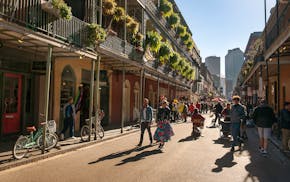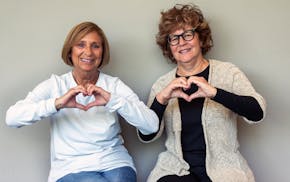Although "I Am Nobody's Slave" takes the form of a memoir, Minnesota native Lee Hawkins' book becomes something bigger: an examination of where violence in Black homes originates and a plea to end corporal punishment.
Hawkins spoke last year with the Minnesota Star Tribune's Laura Yuen about the horrific abuse he suffered, at the hands of both parents, when he was growing up in Maplewood. It's detailed again in "Nobody's Slave," including an incident when he needed surgery and three months in an upper-body cast after his father stood on his back. But, after a first half that deals with his youth, "Nobody's Slave" broadens to include research suggesting corporal punishment is a logical-but-frightening extension of America's history of slavery.
In the book, Hawkins argues the behavior of some Black parents is directly linked to generational trauma that began when their enslaved ancestors stopped at nothing to protect their children, even if that meant harming them. The former Wall Street Journal reporter, a Pulitzer Prize finalist in 2022 for writing about the Tulsa massacre, also connects spanking to the Jim Crow-era crime of lynching, both of which often involve belts.
Hawkins, back in the Twin Cities working with MPR on a podcast about real estate discrimination, speaks about his writing roots in Minnesota, about listening to elders' stories (citing the Alex Haley quotation, "Every time an old person dies, it's like a library burning down") and about working up the nerve to detail events that "for most of my life, touched me in a place too deep to open up about."
Q: You've always been a fan of words but it sounds like your great-grandmother played a big role in you becoming a writer?
A: One of the most striking things was my great-grandmother was always encouraging me to write, telling me writing and journalism could be a career for me. She used to tell me about this guy, Carl T. Rowan, a [legendary, Black] journalist for the Washington Post who went on to work as an ambassador under the Carter administration. He was their tenant. He rented a place from them when he was a student at the University of Minnesota [in the 1940s].
Q: And the reason he was at your great-grandparents' had to do with racism?
A: The University of Minnesota didn't allow Black students, Jewish students to live in the dormitories on campus. So that left a lot of students, who were on the fringes of society, to find places to live. And they often would rent from people like my grandparents.
Q: One irony of the book is that you and your family were active in fighting racism and violence while, at the same time, your own home was a violent place?
A: As a young person, I was very influenced by Dr. Martin Luther King Jr. and went to the Dr. Martin Luther King Center in the Rondo community in St. Paul. And, as a member of Mount Olivet Baptist Church [in St. Paul], a lot of leaders would come to my church — Dave Durenberger, Mark Dayton, Walter Mondale — and the whole idea was they needed the support of the Black community and what was foundational within that was the legacy of nonviolent social change.
Q: But no one saw that connecting to private homes?
A: Corporal punishment was, at the time and still is in many ways, looked at as a protective measure. My parents definitely felt they needed to scare me so I could act perfectly and avoid becoming a Philando Castile or George Floyd.
Q: ...which the book indicates was not such a distant possibility?
A: Four kids I knew were murdered in my high school. Every year, a different Black kid I knew got murdered.
Q: As a survivor of abuse, you've argued against corporal punishment, but that's also based on quite a bit of research, both for your podcast and your book?
A: The thing is, [spanking and other corporal punishment] really is not controversial, even outside of the Black community. I don't think violence against children is controversial at all. Seventeen states, primarily in the slavery states and mostly where lynching was prolific, still allow children to be paddled, hit three times on the rear with these thick paddles. I found examples in Mississippi and Alabama where schools beat children an average of 15 times in one school year. I found one little boy who had been paddled 52 times in one school year. I wonder how a child can function at that level because of how it hardwires your body for anxiety. Your fight-or-flight system is constantly being triggered, like mine was.
Q: You made peace with both parents and, in the book, you're remarkably even-handed about their punishment. What's the goal of the book?
A: What I don't want to do is to pass judgment on families who engage in a practice that is highly normalized, governmentally normalized. My goal is to inform people, who can make their decisions based on knowledge and critical thinking.
Q: But you have concerns about that very critical thinking, don't you?
A: I wouldn't be surprised if this book got banned from certain places and what's sad is it's the places that need it the most: Florida, Alabama, Mississippi. Our children need to know about this history. It doesn't mean you hate the country. We love the country and study it to avoid the mistakes we made in the past.
Q: But you have hope one generation can learn from the previous generation's errors, right?
A: The reason my mother and I have a relationship now, and a good one, is I understood that you have to meet people where they are. I know my mother was a hardworking woman who sacrificed a lot in her life and went through childhood trauma herself. We live in this society where baby boomers and the Greatest Generation people had it rough, especially Black Americans.
Q: Say more about that?
A: When I think back to my grandparents and great-grandparents and all the people in my church community, the World War II vets and Korean vets, I understand that life was no crystal stair for them. I was blessed to be able to get myself into a position where I had a backboard, to study and write about this fascinating subject.
Q: You name lots of names in the book. How come?
A: I get emotional when I reflect on great Americans who were born in 1910, 1920, 1930 — my great-grandparents and the effect they had on my life. They had a house on Avon Street in Rondo and another house on a lake in Wisconsin, and this was during racial covenants. They were hardworking Americans and I just think, "Of course they manifested everything that came after them." Sometimes, you don't realize it until they're gone, but in the Black culture, we have a song by James Cleveland that goes, "Give me my flowers while I live so I can see the beauty that they bring." So I tried my best to name a lot of people who served as guiding lights when I was a kid at the darkest times of my life, when I hated myself.
Q: And the helpers weren't all family members?
A: Mrs. Nordhausen, she was the librarian at Weaver Elementary School in Maplewood, and the library was a safe space for me. It was a place where I could go and nobody was going to bother me. She made that space. When you look at these people who encourage children to read, to expose them to different professions and history and ideas — yes, it does manifest the future.
I Am Nobody's Slave
By: Lee Hawkins.
Publisher: Amistad, 355 pages, $28.99.
Event: 6:30 p.m. Jan. 30, Zoom conversation with Lissa Jones. Free, register at supporthclib.org.

Minnesotans find beautiful views, food and fun on trip to New Orleans via train
Ever wonder why the Northwest produces so many serial killers?

Embrace Minnesota's growing seasons at these 76 farmers markets

Old School Jewish Matchmakers offer timeless perspective on dating
